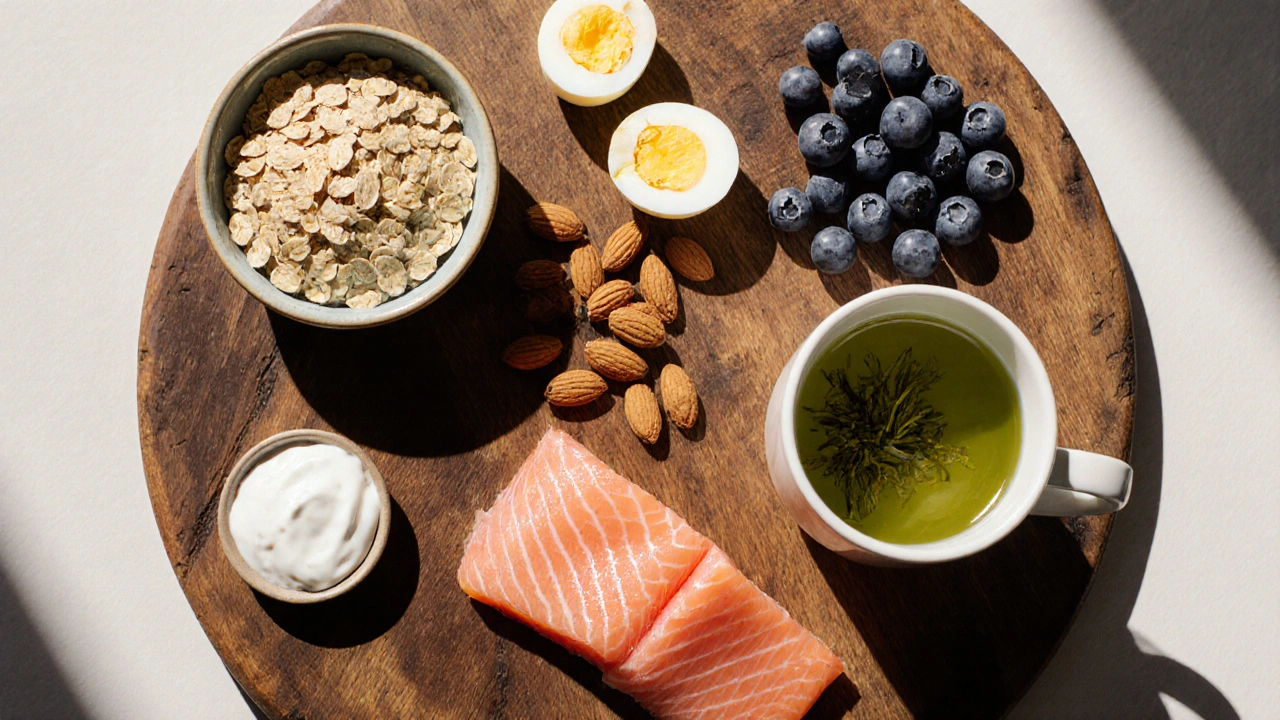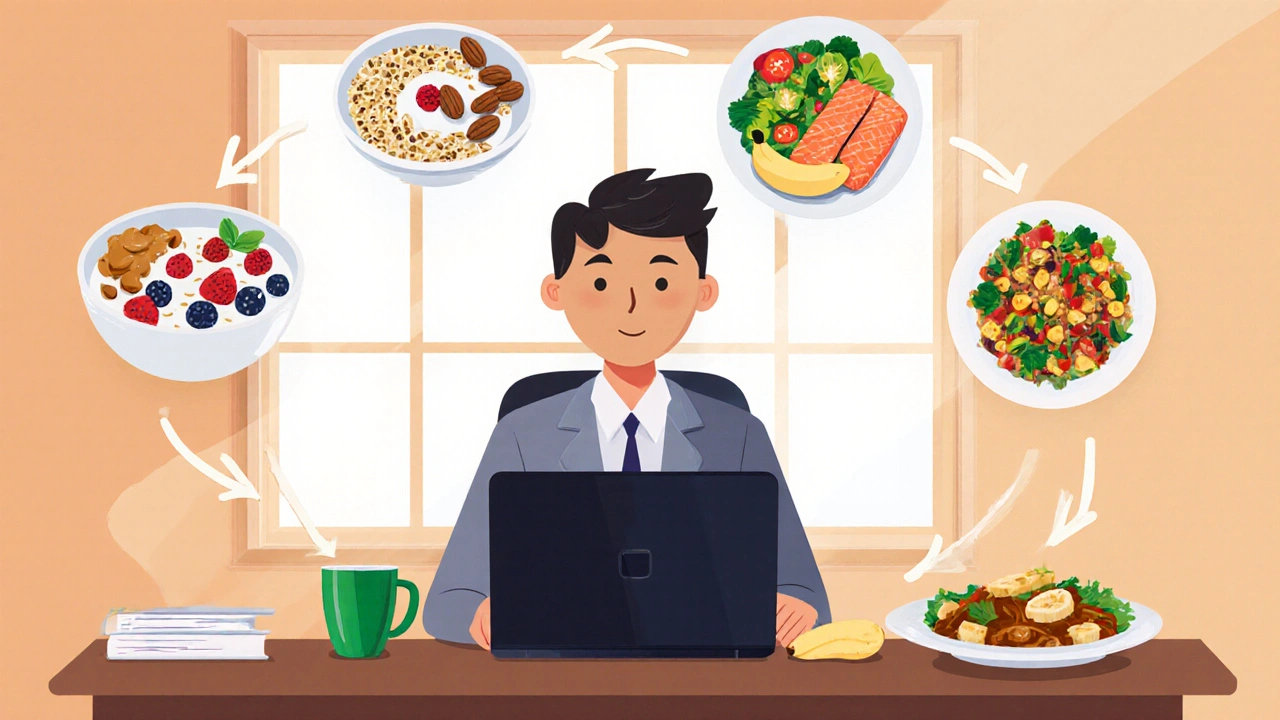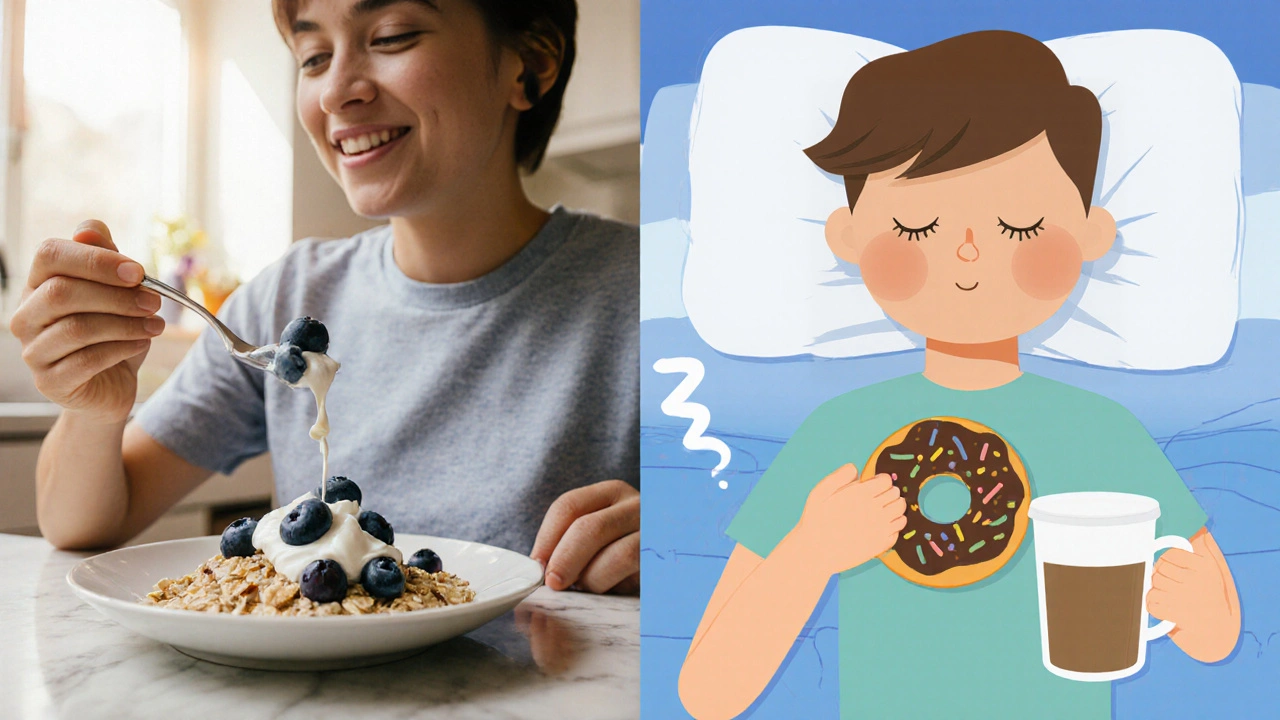Energy-Boosting Foods Calculator
Recommended Energy Foods
Your personalized list of foods to boost alertness and combat sleepiness based on your inputs.
When you feel sluggish mid‑day, the culprit is often not just lack of sleep but what you’ve been eating. Diet is a set of foods and drinks you consume regularly, influencing blood sugar, hormone balance and brain chemistry plays a direct role in sleepiness and how sharply you can stay focused. Understanding that link lets you choose meals that keep energy stable and mental fog at bay.
Why Food Affects Your Alertness
Two main mechanisms drive the diet‑sleepiness connection:
- Blood‑sugar swings: Simple carbs cause a rapid spike in glucose, followed by a crash that leaves you tired.
- Neurotransmitter support: Certain nutrients act as raw material for dopamine, norepinephrine and serotonin - chemicals that keep you awake and motivated.
When you pair low‑glycemic carbs with protein and healthy fats, you dampen the spike‑crash cycle and supply a steady stream of fuel to the brain.

Key Nutrients That Fight Fatigue
Here are the nutritional heavy‑hitters proven to boost alertness:
- Complex carbohydrates (e.g., oats, quinoa) release glucose slowly, preventing sudden drops.
- Protein provides amino acids like tyrosine, which the brain turns into dopamine.
- Omega‑3 fatty acids (found in fatty fish, walnuts) support cell membranes and improve neurotransmission.
- Magnesium helps regulate the sleep‑wake cycle and reduces the feeling of mental fatigue.
- Vitamin B12 is essential for red‑blood‑cell production, which transports oxygen to the brain.
- Caffeine blocks adenosine receptors, giving a short‑term boost without the crash if used wisely.
Top 7 Foods to Keep You Energized
| Food | Key nutrients | How it helps |
|---|---|---|
| Oats | Complex carbs, beta‑glucan, magnesium | Slow‑release glucose keeps blood sugar level even for 3‑4hours. |
| Eggs | Protein, choline, B12 | Choline fuels acetylcholine production, a neurotransmitter linked to attention. |
| Blueberries | Antioxidants, vitamin C, fiber | Antioxidants protect brain cells from oxidative stress that can cause sluggishness. |
| Almonds | Magnesium, healthy fats, protein | Magnesium supports ATP production - the cell’s energy currency. |
| Salmon | Omega‑3 (EPA/DHA), vitamin D, protein | Omega‑3s improve neuronal signaling, sharpening mental clarity. |
| Greek yogurt | Protein, probiotics, calcium | Protein curbs cravings; probiotics aid gut‑brain communication, influencing mood. |
| Green tea | Caffeine, L‑theanine | Combo provides alertness without the jitter‑crash of coffee. |

How to Build an All‑Day Energy‑Boosting Meal Plan
Start with a balanced breakfast, keep a smart snack ready, and end the day with a light dinner that won’t spike insulin overnight.
- Breakfast (7‑9am): ½ cup cooked oats topped with a handful of blueberries and a spoonful of Greek yogurt. Add a boiled egg on the side for extra protein.
- Mid‑morning snack (10‑11am): A small handful of almonds plus a cup of green tea.
- Lunch (12‑2pm): Mixed‑leaf salad with grilled salmon, quinoa, cherry tomatoes, and a drizzle of olive oil. The combo gives complex carbs, omega‑3s and magnesium.
- Afternoon pick‑me‑up (3‑4pm): A piece of fruit (apple or banana) with a tablespoon of peanut butter. The natural sugar plus fat prevents a crash.
- Dinner (6‑8pm): Stir‑fried vegetables with tofu or chicken, served over brown rice. Keep portions moderate to avoid heavy digestion before bedtime.
Hydration matters, too. Aim for 1.5‑2L of water a day; dehydration can masquerade as fatigue.
Common Pitfalls & How to Avoid Them
- Relying on sugary drinks: Energy drinks give a quick lift but cause a dramatic dip within an hour. Swap them for green tea or sparkling water with a squeeze of lemon.
- Skipping breakfast: Low blood sugar first thing makes the brain work harder, increasing perceived sleepiness.
- Eating large, heavy meals after 8pm: Digestion steals blood flow from the brain, disrupting night‑time rest and making you groggy the next morning.
- Neglecting micronutrients: Iron deficiency or low B‑vitamin levels can create chronic fatigue. Include leafy greens, legumes and fortified cereals.

Quick Tips for Immediate Energy Boost
- Grab a banana with a few almonds - natural carbs + magnesium.
- Sip a cup of green tea 30minutes before a meeting for calm alertness.
- Stand up and stretch for two minutes every hour; movement improves circulation and keeps glucose from pooling.
- If you need caffeine late in the day, limit to 50mg (about half a cup of coffee) and pair with protein to smooth the effect.
Frequently Asked Questions
Can I rely on coffee alone to stay awake?
Coffee spikes alertness but often leads to a crash 2‑3hours later. Pairing coffee with protein (e.g., a hard‑boiled egg) or choosing green tea (caffeine + L‑theanine) provides steadier focus.
How many meals should I eat to avoid sleepiness?
Most people feel best with 3 balanced meals and 2‑3 small snacks that combine carbs, protein and healthy fats. This prevents big blood‑sugar swings throughout the day.
Is it okay to eat fruit on an empty stomach?
A piece of fruit can be a good wake‑up snack, but combine it with protein (yogurt, nuts) to slow absorption and avoid a rapid glucose spike.
What role does magnesium play in alertness?
Magnesium is a co‑factor in over 300 enzymatic reactions, including ATP production. Low magnesium can make the brain feel sluggish, so foods like almonds, spinach and black beans are essential.
Can I eat a heavy dinner and still sleep well?
Heavy, high‑fat meals close to bedtime delay gastric emptying, which can interrupt REM sleep and leave you groggy. Aim for a lighter plate with lean protein and vegetables at least two hours before bed.

10 Comments
Jon ShematekOctober 8, 2025 AT 14:04
Grab a handful of almonds with your morning coffee for a steady lift!
Beverly PaceOctober 12, 2025 AT 03:24
While that sounds tasty, we should remember that relying on caffeine and nuts alone skirts the moral responsibility we have to fuel our bodies with truly wholesome, unprocessed foods. Sugar‑laden snacks masquerade as "energy boosters" but they only set us up for a crash later. Choosing whole‑grain oatmeal or fresh fruit respects both our health and the environment.
RALPH O'NEILOctober 15, 2025 AT 16:44
Interesting points all around. I’ve found that spacing meals about three hours apart keeps my blood sugar level flat and my focus sharp. The combination of protein and complex carbs seems to work best for me.
Mark WellmanOctober 19, 2025 AT 06:04
Okay, let me break this down for anyone who actually reads this, because apparently the internet needs another "expert" to tell us that oats are good for you. First off, the whole concept of "slow‑release glucose" is just marketing hype dressed up in fancy science words that sound impressive when you’re scrolling at 3 am on a phone that’s charging next to a half‑empty coffee mug. Second, the article lists a bunch of foods like eggs and salmon and then pretends that adding a sprinkle of chia seeds will magically turn you into a superhero who never feels tired – news flash: your body still needs sleep, and no amount of magnesium in almonds is going to fix that. Third, the suggestion to drink green tea for "alertness without the jitter‑crash" ignores the fact that caffeine, even when paired with L‑theanine, still stimulates the central nervous system and can make you feel wired, which for some people actually leads to a worse crash later on – remember the old adage, "what goes up must come down". Fourth, the “meal plan” they propose is basically a copy‑paste of a generic diet blog that anyone could find on a random health site, complete with a random list of quinoa, tofu, and "a drizzle of olive oil" that sounds like it was written by someone who never actually cooked. Fifth, hydration is mentioned, but the advice to aim for 1.5‑2 L a day is a one‑size‑fits‑all number that doesn't take into account your weight, activity level, or climate – you could be a marathon runner in a desert and still be told to just drink two liters. Sixth, the article warns against sugary drinks but then casually mentions "a splash of lemon in sparkling water" – a detail that feels like a token nod to health while still promoting sugary flavors via the implied sweetness of the soda base. Seventh, the piece at one point says "skip breakfast and you’ll feel sluggish" yet later lists a massive breakfast that includes oats, blueberries, Greek yogurt, and a boiled egg – which, if you think about it, is basically a full‑fat, high‑protein, high‑fiber meal that not everyone has time to prepare in the morning. Eighth, the recommended "mid‑morning snack" of a banana with almonds is just a thinly veiled attempt to market almond butter as a superfood, even though the nutritional benefit over plain almonds is negligible. Ninth, the entire tone of the article assumes a Western, middle‑class lifestyle with access to fresh salmon, Greek yogurt, and specialty teas, which excludes a huge portion of the global population who simply can't afford or access these items. Tenth, the mention of "Omega‑3s improve neuronal signaling" is technically true but oversimplified – you need a balanced intake of EPA and DHA, not just a single serving of fish, to see any measurable effect. Eleventh, the article claims that magnesium supports ATP production, which is true at a cellular level, but doesn't explain that only severe deficiencies would actually impair ATP synthesis in a way noticeable to most people. Twelfth, the notion that "probiotics aid gut‑brain communication" is still a developing field, and the article glosses over the fact that not all probiotic strains have the same effects. Thirteenth, the emphasis on "complex carbs" ignores fiber content that can cause gastrointestinal discomfort if not introduced gradually. Fourteenth, the suggestion to avoid heavy dinners after 8 pm is sensible, but it ignores cultural norms where dinner is the main meal of the day. Fifteenth, the article ends with a FAQ that repeats information already covered, making the whole thing feel redundant and padded. In short, while the advice sounds nice on paper, it’s peppered with oversimplifications, questionable assumptions, and a sprinkle of marketing fluff that does more to sell the idea of a perfect diet than to actually help someone struggling with daily fatigue. If you really want to boost your energy, consider a holistic approach: consistent sleep schedule, regular movement, balanced meals tailored to your personal needs, and yes, maybe a cup of green tea if you enjoy it, but don’t expect it to be a miracle cure.
Amy MorrisOctober 22, 2025 AT 19:24
That was an intense read, and I can see the frustration behind it. It’s true that no single food can replace solid sleep, but the science behind magnesium and omega‑3s does have merit. Even if the article glosses over some details, many people find real benefit from incorporating those foods gradually. Let’s remember that personal experience matters, and a balanced approach can still be empowering.
Francesca RobertsOctober 26, 2025 AT 07:44
Sure, the "Energy‑Boosting Foods Calculator" sounds fancy, but at the end of the day it’s just a list of things you probably already have in your fridge.
Becky JarboeOctober 29, 2025 AT 21:04
While the calculator may be rudimentary, the underlying principle of synchronizing macronutrient timing with circadian rhythms is well‑established in the literature. By aligning carbohydrate intake to periods of heightened insulin sensitivity, such as post‑exercise windows, one can optimize glycogen replenishment and mitigate post‑prandial lethargy. Integrating nutrient‑dense foods like oats, eggs, and almonds into structured meal blocks can thus support sustained neurocognitive performance.
Carl BoelNovember 2, 2025 AT 10:24
It’s a shame that this piece tries to push a one‑size‑fits‑all diet plan while ignoring the unique nutritional heritage of each nation. A truly effective approach would respect regional cuisines and the agricultural strengths of our own country.
Shuvam RoyNovember 5, 2025 AT 23:44
While I appreciate the sentiment, a balanced diet does not need to be tied to any specific national identity. The key is to ensure adequate intake of essential nutrients, regardless of cultural background.
Jane GrimmNovember 9, 2025 AT 13:04
One must commend the author for attempting to convey nutritional guidance, yet the prose suffers from a lack of precision and an overabundance of colloquialisms that undermine its authority.